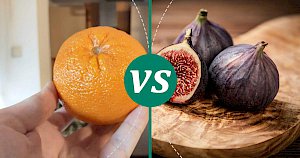Figs vs Orange: Nutrition & Calories Compare


Fig vs Orange
Nutrition Facts
Serving size:
change
5g10g15g20g30g40g50g60g80g100g120g140g160g180g200g220g250g300g350g400g450g500g600g700g800g900g1000g
1oz2oz3oz4oz5oz6oz7oz8oz10oz12oz15oz20oz25oz30oz35oz40oz50oz
Amount Per Serving:
Serving size:
change
5g10g15g20g30g40g50g60g80g100g120g140g160g180g200g220g250g300g350g400g450g500g600g700g800g900g1000g
1oz2oz3oz4oz5oz6oz7oz8oz10oz12oz15oz20oz25oz30oz35oz40oz50oz
Amount Per Serving:
Fig vs Orange 100g Compare
| per 100g | Figs | Orange |
|---|---|---|
| Calories | 74 | 47 |
| Carbohydrates | 19.18 g | 11.75 g |
| Fat | 0.3 g | 0.12 g |
| Saturated fat | 0.06 g | 0.02 g |
| Dietary fiber | 2.9 g | 2.4 g |
| Protein | 0.75 g | 0.94 g |
| Water | 79.11 g | 86.75 g |
| Calcium | 35 mg | 40 mg |
| Iron | 0.37 mg | 0.1 mg |
| Magnessium | 17 mg | 10 mg |
| Potassium | 232 mg | 181 mg |
| Vitaminium A | 142 µg | 225 µg |
| Vitaminium B1 (Thiamine) | 0.06 mg | 0.087 mg |
| Vitaminium B2 (riboflavin) | 0.05 mg | 0.04 mg |
| Vitaminium B3 (Niacin) | 0.4 mg | 0.282 mg |
| Vitaminium B5 | 0.3 mg | 0.25 mg |
| Vitaminium B6 | 0.113 mg | 0.06 mg |
| Vitaminium B9 (Folic acid) | 0.006 mg | 0.03 mg |
| Vitaminium C | 2 mg | 53.2 mg |
| Vitaminium E | 0.11 mg | 0.18 mg |
Discover the Nutritional Treasures of Figs and Oranges
Figs and oranges may seem worlds apart in taste and texture, but they share a common ground in offering a plethora of nutritional benefits. Figs, with their unique, sweet flavor and soft, chewy texture, are often associated with ancient cultures and are known for their health benefits. Oranges, on the other hand, are universally beloved for their refreshing zest and are synonymous with vitamin C. But there's more to these fruits than meets the eye.
Delving into the Nutritional Content
When comparing figs and oranges, it's fascinating to see how these fruits stack up against each other nutritionally. With **74 calories per 100 grams**, figs are slightly more calorie-dense than oranges, which have **49 calories per 100 grams**. This might be an essential factor for those closely monitoring their calorie intake. However, it's crucial to look beyond calories when assessing the value of these fruits in your diet.
Carbohydrates provide the body with much-needed energy, and here, figs lead with **19.18 grams** compared to oranges' **11.89 grams**. Yet, oranges are not far behind in fiber content, offering **2.5 grams** against figs' **2.9 grams**, making both fruits excellent for digestive health.
Both fruits contain minimal fat, clocking in at **0.3 grams** each, and are virtually cholesterol-free, aligning with heart-healthy dietary guidelines. Protein-wise, oranges slightly edge out with **0.94 grams** compared to figs' **0.75 grams**, although neither fruit is a significant protein source.
On the micronutrient front, oranges are a powerhouse of vitamin C, boasting **48.5 mg**, far surpassing figs' modest **2 mg**. This makes oranges a superior choice for immune support and skin health. Figs, however, offer more when it comes to minerals like calcium and potassium, essential for bone health and muscle function.
What About the Taste and Versatility?
Taste and versatility in the kitchen also play a crucial role in choosing between figs and oranges. Figs, with their unique sweetness, can elevate dishes ranging from salads to desserts. Oranges, with their vibrant flavor, are not just for snacking; they can also add a refreshing twist to both savory and sweet recipes.
So, Which Is Better?
The choice between figs and oranges ultimately depends on your nutritional needs and personal preferences. If you're after a vitamin C boost, oranges are your go-to. But for a fiber-rich, potassium-packed option, figs might be the winner. Why not enjoy both and reap the diverse benefits they offer?
Remember, a balanced diet is about variety and moderation. Both figs and oranges can contribute to a healthy, balanced diet, offering more than just their sumptuous flavors. So next time you're pondering a snack or planning a meal, consider incorporating these nutritional treasures.
Figs 100g
74kcalCalories source
- 93% CARBS.
- 4% PROTEIN
- 3% FAT
Orange 100g
47kcalCalories source
- 91% CARBS
- 7% PROTEIN
- 2% FAT
Compares of fig
- Fig vs Apple
- Fig vs Apricot
- Fig vs Avocado
- Fig vs Banana
- Fig vs Blackberry
- Fig vs Blackcurrants
- see all compares of fig
Marcin Piotrowicz
calories-info.com creator
Healthy diet and healthy lifestyle promoter
Add comment